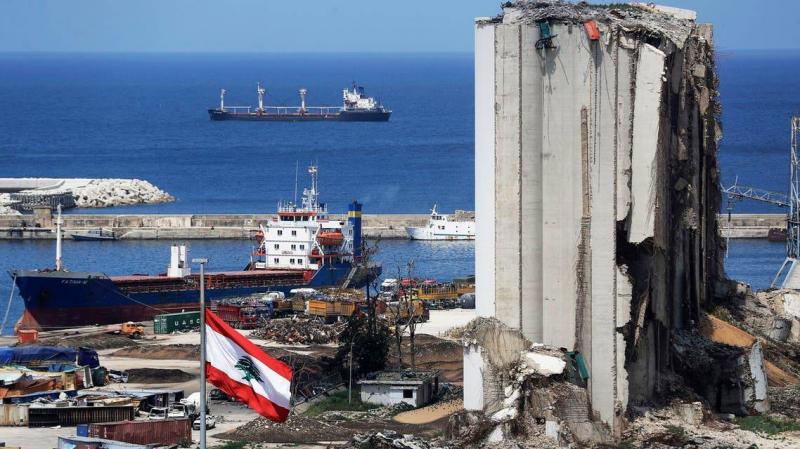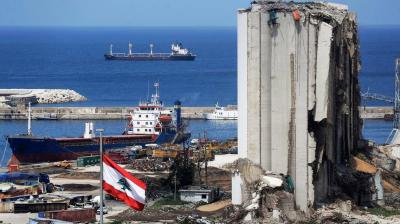On Tuesday, Human Rights Watch accused Lebanese authorities of "criminal" negligence and violating the right to life, following an investigation that highlighted the failures of political and security officials in handling the ammonium nitrate shipment that led to the Beirut port explosion last year. The organization recommended imposing sanctions on the officials involved and called for the United Nations to conduct an independent investigation into the disaster, which resulted in at least 214 deaths and over 6,500 injuries, stemming from 2,750 tons of ammonium nitrate that had been stored for years in warehouse number 12 at the port.
The organization detailed the mistakes and oversights made by employees, political, and security officials in managing the ammonium nitrate shipment from its arrival at the port aboard the Russian ship Rhosus in 2013 until the explosion, in a comprehensive 126-page report released during a press conference in Beirut on Tuesday. In addition to interviews with officials, the organization published dozens of correspondences among various entities, including the port administration, customs, port employees, the general security agency, and the ministries of public works, transportation, and finance, up to judges, army leadership, the president, and the prime minister.
Previous media investigations have shown that various officials, including President Michel Aoun, security leaders, and military personnel, were aware of the risks associated with storing the material in the port but took no action. Human Rights Watch stated, "The evidence indicates that many Lebanese officials were, at the very least, criminally negligent under Lebanese law in their handling of the shipment, creating an unreasonable danger to life." It added, "Official documents show that some government officials anticipated and implicitly accepted the risks of death posed by the presence of ammonium nitrate in the port," explaining that "under local law, this conduct could amount to murder and/or unintentional homicide."
The report continued, "Under international human rights law, a state's failure to act to prevent foreseeable threats to life violates the right to life." Although several documents outlined the dangers of ammonium nitrate to public safety, some correspondences failed to clarify these risks, only hinting at the environmental impact. Various documents also demonstrated the failures of responsible parties and their neglect of necessary steps that could have been taken to ensure the safety or destruction of the materials.
The materials were stored alongside "flammable or explosive" substances, as the investigation revealed. The military command only reported not needing the materials, despite being responsible for approving the import and re-export of ammonium nitrate when its nitrogen content exceeded 33.5%, as was the case with the stored shipment. The organization accused the ministries of finance and public works and transportation of "failing to communicate or conduct an adequate investigation" concerning the shipment and its risks, while stating that "none of the security agencies operating at the port took appropriate measures to ensure the safety of the materials or developed an emergency plan or precautionary procedures in case of fire."
Months before the explosion, the General Directorate of State Security noted in a report that the ignition of these materials could lead to a devastating explosion and later informed the authorities of their dangers. The organization considered that the State Security agency delayed informing officials of its findings, pointing out that customs could have disposed of the materials but failed to take appropriate action. The then-Prime Minister Hassan Diab learned for the first time of the shipment’s existence in June 2020 and told Human Rights Watch that he had asked the State Security agency to prepare a report within days. He added, "I forgot about it later, and no one followed up on the matter. Disasters occur every day."
On July 20, both Aoun and Diab received a brief "incomplete" report from the State Security agency about the dangers of ammonium nitrate in case of ignition or theft. Human Rights Watch pointed fingers at Aoun, Diab, State Security General Director Tony Saliba, former army chief Jean Kahwaji, former finance minister Ali Hassan Khaleel, and former public works ministers Ghazi Zeaiter and Youssef Fenianos. It found that these individuals, among others, "failed to take necessary measures to protect people."
Political immunity currently obstructs a request made by the investigating judge Tarek Bitar to summon deputies who held ministerial positions, including Zeaiter, Khaleel, and Fenianos, as well as security leaders, including Saliba. Bitar also charged Diab and Kahwaji. Human Rights Watch urged the international community to impose sanctions on officials "involved in ongoing human rights violations related to the explosion and seeking to undermine accountability." The organization reiterated its call to the UN Human Rights Council to conduct an independent investigation into the explosion, noting that an independent probe could potentially identify the spark that led to the explosion.
The organization’s report did not answer questions related to how the explosion ignited but raised doubts about whether the ammonium nitrate shipment was intended for Mozambique, as indicated by the ship's shipping documents, or whether Beirut was its actual destination.




